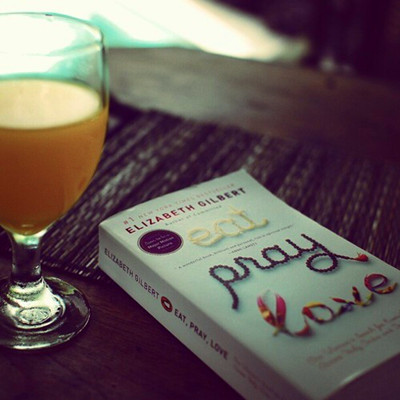(单词翻译:单击)

We have our favorite visits in town, always stopping to pay respects to the temple, and to say hello to Mr. Panicar, the tailor, who shakes our hands and says, "Congratulations to meet you!" every time. We watch the cows mill about enjoying their sacred status (I think they actu-ally abuse the privilege, lying right in the middle of the road just to drive home the point that they are holy), and we watch the dogs scratch themselves like they're wondering how the heck they ever ended up here. We watch the women doing road work, busting up rocks under the sweltering sun, swinging sledgehammers, barefoot, looking so strangely beautiful in their jewel-colored saris and their necklaces and bracelets. They give us dazzling smiles which I can't begin to understand—how can they be happy doing this rough work under such terrible conditions? Why don't they all faint and die after fifteen minutes in the boiling heat with those sledgehammers? I ask Mr. Panicar the tailor about it and he says it's like this with the villa-gers, that people in this part of the world were born to this kind of hard labor and work is all they are used to.
我们去城里自己喜欢的地方逛逛,经常在寺院停下来朝拜,跟裁缝先生帕尼卡打招呼,每回他总跟我们握手说:“恭喜认识你!”我们看牛在路上乱转,享受它们的神圣地位(我认为它们简直滥用特权,大剌剌躺在路中间,只为阐明自己神圣不可侵犯);我们看狗给自己搔痒,仿佛在想自己怎么会在这儿。我们看妇女从事道路施工,在炎炎烈日下敲石头,赤脚挥着大锤,身穿珠宝色的纱丽、戴项链和手镯,看起来美得出奇。她们对我们嫣然而笑;我无法明白的是,她们怎能在这样可怕的环境下,如此快乐地从事粗重的活儿?在酷暑中扛着大槌,十五分钟过后,怎么不会昏死过去?我问裁缝先生帕尼卡,他说村民都像这样,此地的人生来就得做这些苦工,他们习惯劳动。
"Also," he adds casually, "we don't live very long around here."
“还有,”他又轻描淡写地说,“我们这儿的人活不太长。”
It is a poor village, of course, but not desperate by the standards of India; the presence (and charity) of the Ashram and some Western currency floating around makes a significant difference. Not that there's so much to buy here, though Richard and I like to look around in all the shops that sell the beads and the little statues. There are some Kashmiri guys—very shrewd salesmen, indeed—who are always trying to unload their wares on us. One of them really came after me today, asking if madam would perhaps like to buy a fine Kashmiri rug for her home?
当然,这是个贫穷村庄,可是就印度的标准而言,并不太穷;道场的存在(与慈善事业)以及西方货币的流通,使情况大为改善。这儿能买的东西不多,尽管理查和我喜欢逛几家卖宝石和小雕像的商店。有几个喀什米尔小伙子——很精明的推销员——老是想向我们倾销商品。其中有个人今天跟在我身后,问这位女士或许想买一条喀什米尔地毯来装饰她家?
This made Richard laugh. He enjoys, among other sports, making fun of me for being homeless.
这让理查发笑。他的消遣包括喜欢取笑我无家可归。
"Save your breath, brother," he said to the rug salesman. "This old girl ain't got any floors to put a rug on."
“省省力气吧,老兄,”他对地毯销售员说,“这位老姐没有地板来铺地毯。”
Undaunted, the Kashmiri salesman suggested, "Then perhaps madam would like to hang a rug on her wall?"
喀什米尔推销员毫不气馁地提议“那么或许女士想在墙上挂张毯子?”
"See, now," said Richard, "that's the thing—she's a little short on walls these days, too."
“听着,”理查说道,“是这样的——近来她连墙壁都缺。”
"But I have a brave heart!" I piped up, in my own defense.
“可是我不缺勇敢的心。”我高声说道,为自己辩护。
"And other sterling qualities," added Richard, tossing me a bone for once in his life. Eat, Pray, Love
“以及其他美德。”理查又说,他这辈子总算丢了一次骨头给我。


